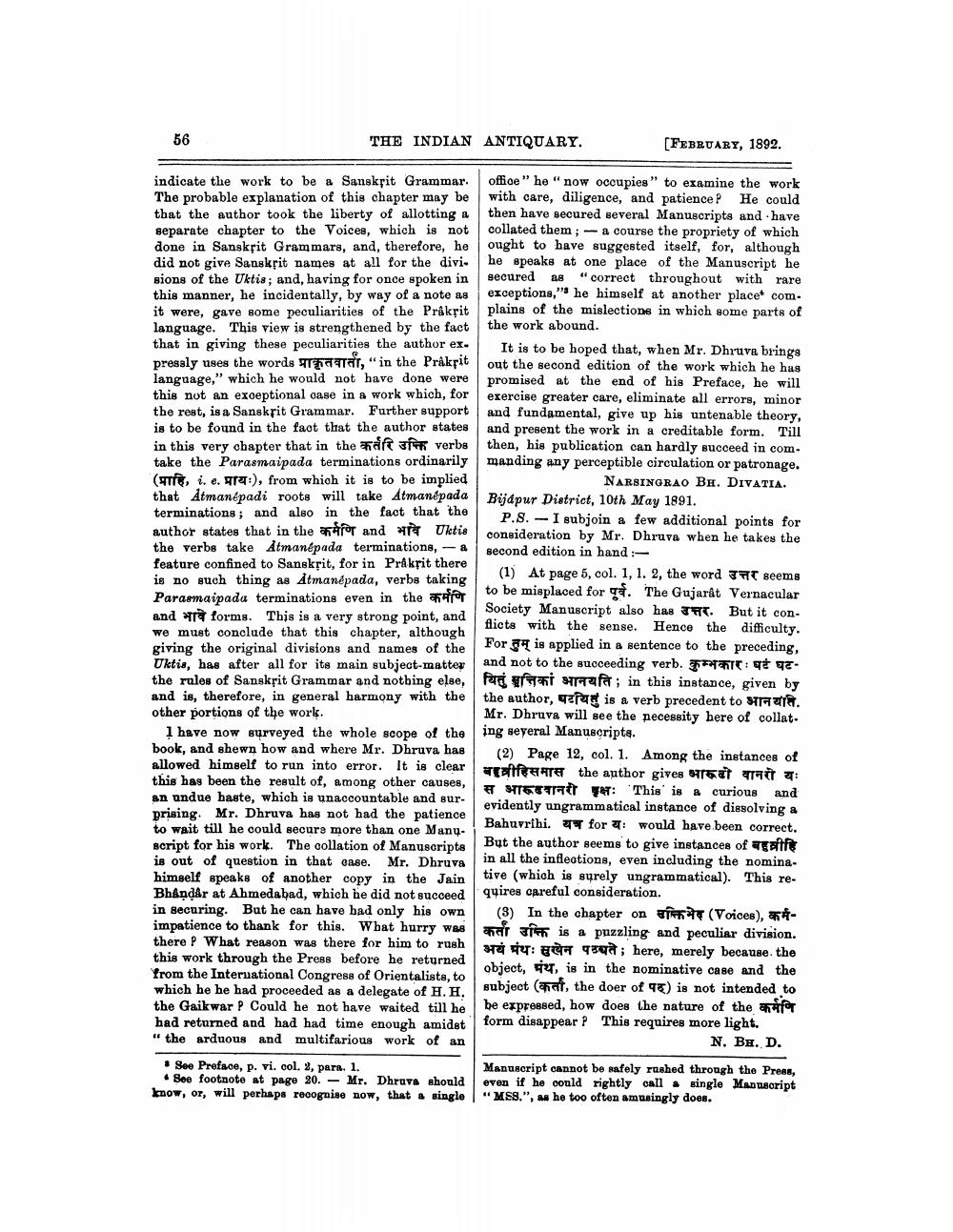________________
56
THE INDIAN ANTIQUARY.
(FEBRUARY, 1892.
indicate the work to be a Sanskrit Grammar. office" he "now occupies" to examine the work The probable explanation of this chapter may be with care, diligence, and patience? He could that the author took the liberty of allotting a then have secured several Manuscripts and have separate chapter to the Voices, which is not collated them; - a course the propriety of which done in Sanskrit Grammars, and, therefore, he ought to have suggested itself, for, although did not give Sanskrit names at all for the divi. he speaks at one place of the Manuscript he sions of the Uktis; and, having for once spoken in secured as "correct throughout with rare this manner, he incidentally, by way of a note als
exceptions," he himself at another placet com. it were, gave some peculiarities of the Prakrit plains of the mislections in which some parts of language. This view is strengthened by the fact the work abound. that in giving these peculiarities the author ex.
It is to be hoped that, when Mr. Dhruva bringe pressly uses the words haar," in the Prakpit
out the second edition of the work which he has language," which he would not have done were promised at the end of his Preface, he will this not an exoeptional case in a work which, for exercise greater care, eliminate all errors, minor the rest, is a Sanskrit Grammar. Further support and fundamental, give up his untenable theory, is to be found in the fact that the author states and present the work in a creditable form. Till in this very chapter that in the aft af verbs then, his publication can hardly succeed in com. take the Parasmaipada terminations ordinarily manding any perceptible circulation or patronage. (Th, i. e. :), from which it is to be implied
NARSINGRAO BH. DIVATIA. that Atman padi roots will take Atmanepada Bijapur District, 10th May 1891. terminations, and also in the fact that the
P.S. - I subjoin a few additional points for anther states that in the for and 17 Uktis consideration by Mr. Dhruva when he takes the the verbs take Atmanepada terminations, -a
second edition in hand :feature confined to Sansksit, for in Prakrit there
(1) At page 5, col. 1, 1.2, the word TTT seems is no such thing as Atmanêpada, verbs taking
to be misplaced for Para maipada terminations even in the for
. The Gujarat Vernacular and trà forms. This is a very strong point, and
Society Manuscript also has 3 . But it conwe must conclude that this chapter, although
flicts with the sense. Hence the difficulty. giving the original divisions and names of the
For 4 is applied in a sentence to the preceding, Uktis, has after all for its main subject matter
and not to the succeeding verb. : qt qz. the rules of Sanskpit Grammar and nothing else, Pre s afet; in this instance, given by and is, therefore, in general harmony with the the author, पयितुं is a verb precedent to आनयति. other portions of the work.
Mr. Dhruva will see the necessity here of collat. I have now surveyed the whole scope of the ing several Manuscripte. book, and shewn how and where Mr. Dhruva has (2) Page 12, col. 1. Among the instances of allowed himself to run into error. It is clear
rafare the author gives et c : this has been the result of, among other causes,
स आरूवानरी क्षः This is a curious and an undue baste, which is unaccountable and sur.
evidently ungrammatical instance of dissolving a prising. Mr. Dhruva has not had the patience
Bahuvrihi. to wait till he could secure more than one Manu.
for would have been correct. script for his work. The collation of Manuscripts
But the author seems to give instances of gaitf is out of question in that ease. Mr. Dhruva
in all the infleotions, even including the nominahimself speaks of another copy in the Jaintive (which is surely ungrammatical). This reBhåndár at Ahmedabad, which he did not succeed quires careful consideration. in securing. But he can have had only his own (3) In the chapter on (Voices), **impatience to thank for this. What hurry was par after is a puzzling and peculiar division. there P What reason was there for him to rush
si : U qe; here, merely because the this work through the Press before he returned
object, su, is in the nominative case and the from the International Congress of Orientalists, to which he he had proceeded as a delegate of H.H.
subject that the doer of 9€) is not intended to the Gaikwar P Could he not have waited till he be expressed, how does the nature of the for had returned and had had time enough amidst form disappear P This requires more light. " the arduous and multifarious work of an
N. BH. D.
• See Preface, p. vi. col. 2, para. 1.
* See footnote at page 30. - Mr. Dhruva should know, or, will perhaps recognise now, that a single
Manuscript cannot be safely rushed through the Press, even if he could rightly call . single Manuscript "M88.", who too often amusingly does.




